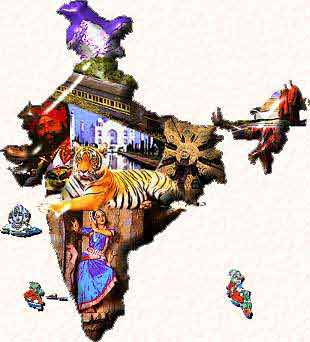
India is a typical place with its own peculiarities. Peculiarity not only in its landscape having all sorts of topographies one can think of, but also in terms of its people with peculiar characteristics- some are very strange not found in other countries’ citizens.
Tough people’s psychological anatomy is shaped by a set of factors, like economical conditions, history, religion, social factors, etc., some features of our people are, I suppose, specific to them. Economic conditions might affect people’s economic behavior in terms of their spending habits, saving habits, brand consciousness, pattern of consumption, investment habits, etc.
American people are more aggressive consumers- living generally beyond their means until recently. Indians largely are more inclined to savings. Sub-Saharan African countries’ people have large marginal propensity to consume because of low level income and low life expectancy. So the economic conditions might have bearings on our economic behaviors. History also has important imprints on one’s behavior.
For instance, we Indians are more receptive, which we learnt through our history having witnessed sundry waves of external cultural invasion, which today make the part of Indian culture. So by nature we are amenable to change and accept. We still lack confidence especially in front of Westerners. This crept in our behavior through our history of slavery to British. Western people are over-confident and aggressive because of their being ruler of the world in the past.
People of the country like Ethiopia, which has experienced dictatorship for a quite while, are very humble and meek. They never question a teacher or what is written in the printed form. They accept it as it is. For that matter, in India, because of its being democratic state for almost half century, people are more vociferous and eloquent.
They put their view point on each issue. Muslim states are more fundamentalist because they have learnt through history to heed without question to clerics and holy book. So history of a country is very important to shape up the behavioral anatomy of its citizen. Same is with the religion and social factors. Christens are more outgoing and liberal people because their religion teaches them to be so. They have casteless society and they love to serve the community.
I think this behavior has emanated from their religion which inculcates the welfare of community. On the contrary, Hindu religion is very liberal one with having thousands of gods and deities. It does not give any definite direction to its devotees and leaves to the individual concerned to follow his/her own rules to achieve Moksh or Nirvana. Even if one does not follow any rule, he is still in its fold.
However, its staunch supporters offer the prayers to idols and the way to get Moksh is through chanting some mantras in isolation. So community feeling is generally missing in Hindu religion. Everybody is after its own Nirvana with giving damn care to community. Rather it encouraged many ill practices like caste-based division of labor and many superstitions.
Islam is strictly rule-based, which codifies each and every activity of its devotees. So it gives little room for questioning to what were relevant thousands years ago. Thus it hinders the rationality to grow and breeds the fundamentalism. Though there is a progressive class in Islam, but their voice is overwhelmed by the majority of staunch supporters.
So the point relevant to my this piece of writing is to highlight those features of Indians which can not be attributed to any of the above cited factors. They are Indian specific. One of these characteristics is we generally take too much pride in individual character. ‘I do not tell a lie, I offer prayer for two hours in the morning daily, I do not take alcohol’ are some examples of such personal character.
They are, no doubt, good enough for your individual health or mental peace. But how have you contributed to the society out of these habits? I think, nothing directly, though indirectly there might be some positive spillover effects. People who do/do not do all these things cited above(making good personal character), in fact, can contribute more to the society.
Everybody has two characters- Individual character and social character. We Indians generally more polish our personal character rather than our social character. I have seen in India people do not even bother to perform minimum social duties. For example, in Metro train, which is a gift to the people of Delhi by Shri Shredhrean, young people generally sit in reserved seats for ladies and old/handicapped people.
They, oblivious with surroundings, would attach their headphone to their ears and either close their eyes or put the gaze down. How will you define this behavior? If one inquires, each one of them might be having excellent personal character. But what about social responsibilities, which is called social character and which is, to me at least, is more important than personal character in modern India.
Persons who are doing all the above cited sins destroying their personal character but still performing their social obligations are more relevant to modern India than the people having excellent record on personal front but poor grade on social front.
I am quite sure that the recent attacks on Indians in Australia, which we promptly tagged as racial attacks, might have been invited by the absence of social character in them. Or at least these factors must have played a major role. This is one example. I would cite and elaborate on other ones in my next piece of writing.



